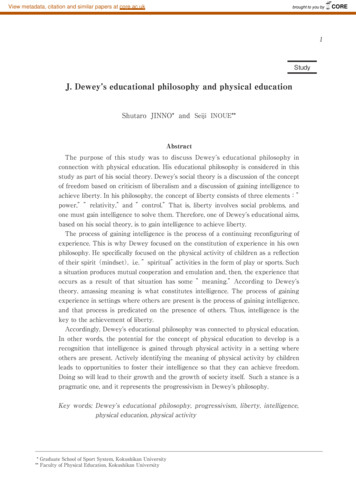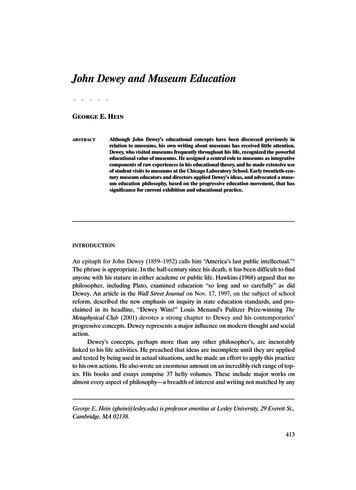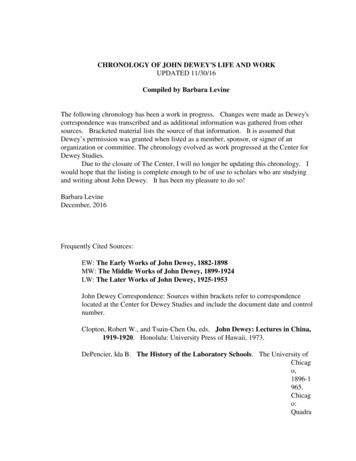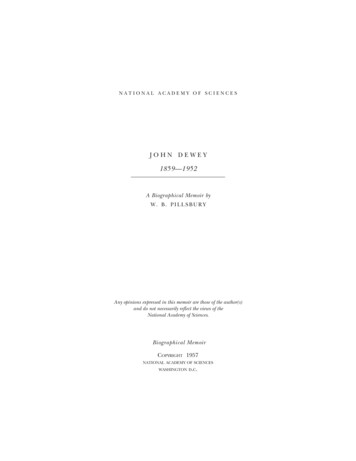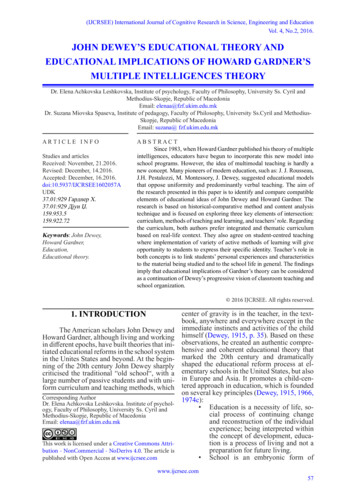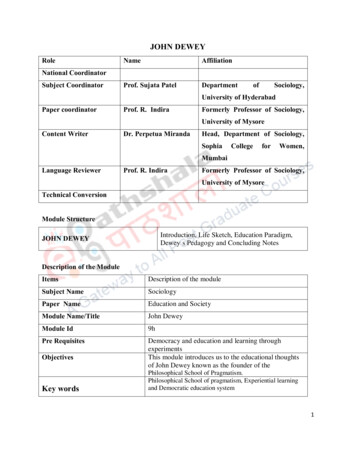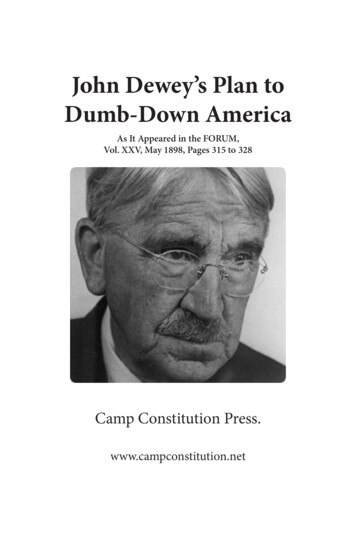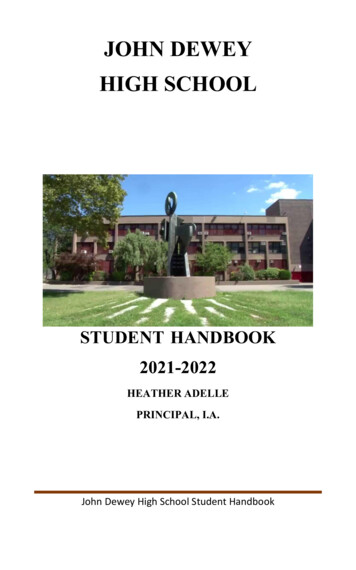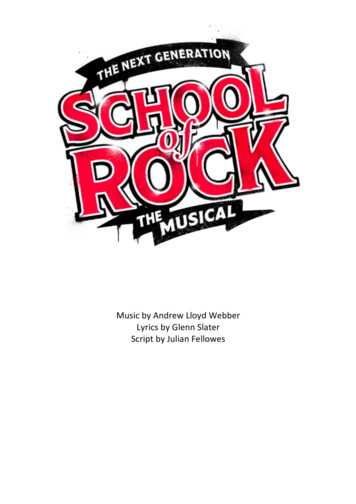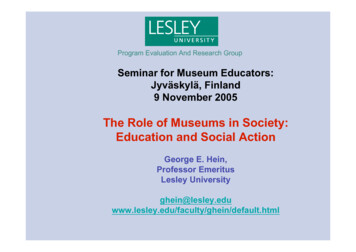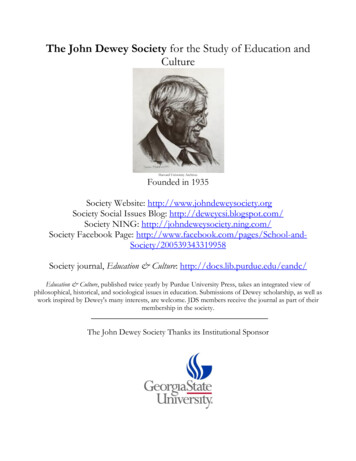
Transcription
The John Dewey Society for the Study of Education andCultureHarvard University ArchivesFounded in 1935Society Website: http://www.johndeweysociety.orgSociety Social Issues Blog: http://deweycsi.blogspot.com/Society NING: http://johndeweysociety.ning.com/Society Facebook Page: 0539343319958Society journal, Education & Culture: http://docs.lib.purdue.edu/eandc/Education & Culture, published twice yearly by Purdue University Press, takes an integrated view ofphilosophical, historical, and sociological issues in education. Submissions of Dewey scholarship, as well aswork inspired by Dewey's many interests, are welcome. JDS members receive the journal as part of theirmembership in the society.The John Dewey Society Thanks its Institutional Sponsor
The John Dewey Society for the Study of Education and CultureAnnual Meeting ProgramApril 27 - 29, 2013San Francisco, CaliforniaSecond Annual School & Society ForumRichard Carranza, San Francisco Unified School District Superintendent (Featured Speaker)Saturday, April 27, 8:30 am to 11:00 amRoom 110, Education Building, University of San Francisco2350 Turk BoulevardSan Francisco, CA 94118Annual Membership MeetingDeron Boyles (President)Saturday, April 27, 12:00 pm to 1:45 pmGrand Hyatt CypressAnnual John Dewey SymposiumSusan Laird, Nick Burbules, Isabel Nuñez, and Eric Bredo (Panelists)Saturday, April 27, 2:00 pm to 4:00 pmGrand Hyatt CypressAnnual John Dewey LectureDavid Labaree (Lecturer); Jane Roland Martin (Outstanding Achievement Award Recipient)Saturday, April 27, 4:15 pm to 6:15 pmGrand Hyatt CypressAnnual ReceptionSaturday, April 27, 6:30 pm to 7:30 pmGrand Hyatt OrpheumPast President’s Paper SessionKathleen Knight-Abowitz (Chair); Jim Garrison (Respondent)Amy Shuffleton, Stefano Oliverio, Len Waks, and Tom Misco (Presenters)Monday, April 29, 4:00 pm to 7:00 pmGrand Hyatt Conference Theater
The John Dewey Society for the Study of Education and Culture&The Master of Arts in Teaching Program/Teacher Education DepartmentSchool of Education at the University of San FranciscoCordially invite you to join in the:2nd Annual School & Society ForumSaturday, April 27th 8:30 am -11:00 amIntent: A public space embracing dialogue, interaction, and deliberation, concerning multiple stakeholdersacross school and society—P-16 teachers, policymakers, administrators, scholars, parents, communityeducators, & other interest groups—drawing upon John Dewey’s thinking and contemporaryreinterpretations, extending Dewey’s commitments to democratic schooling.Where: Room 110, Education Building, 2350 Turk Boulevard, University of San Francisco (see below)PREPARING TEACHERS for a POST-NCLB ERAPanel and Light Breakfast: 8:30 amRichard A. Carranza, Superintendent, San Francisco Unified School District (SFUSD) will initiatethe forum’s conversation as he envisions what preparation entails for his school jurisdiction.Richard A. Carranza was sworn in as the new superintendent of San Francisco Unified SchoolDistrict on June 27, 2012. Mr. Carranza has held the position of Deputy Superintendent ofInstruction, Innovation and Social Justice at the district since 2009. Having entered the publicschool system speaking no English, Mr. Carranza has experienced, first-hand, thetransformational power of access and equity in providing a rich and rewarding education to allstudents.Judy Pace, Teacher Education Professor & Master of Arts in Teaching (MAT) Coordinator,University of San Francisco (USF), will extend the conversation focusing on classroom dialogue andinquiry as key features of courses for prospective teachers.Judy Pace taught in special education and progressive K-12 settings before getting her doctorateat the Harvard Graduate School of Education. She has been teaching at USF since 1998 anddoes research on classroom relationships, curriculum, and teaching within the socio-cultural andpolitical contexts of schooling.
Peter Williamson, Teacher Education Professor, University of San Francisco (USF) & SanFrancisco Teacher Residency (SFTR) Co-Founder and Coordinator and Dorothy Morallos, aresident in the SFTR program, will further extend the conversation by discussing the collaborationamong SFUSD, USF, & Stanford on clinically based teacher preparation through a teacher residencyprogram.Peter Williamson taught middle and high school English and journalism before completing hisPh.D. at Stanford in Curriculum and Teacher Education. He has been teaching at USF since2007 and studies teacher preparation and professional development, teacher effectiveness, andurban education.Dorothy Morallos is a graduate student at the University of San Francisco and is a resident in theSan Francisco Teacher Residency program. Dorothy will begin her teaching career inMathematics and Science in the San Francisco Unified School District in the fall of 2013.Continued Conversation: 9:45 amTeacher Inquiry: Novice Teachers Reflecting on Their PracticeFacilitated by Sarah Capitelli (Professor & Bilingual Authorization Coordinator, USF), with David Hansen(Professor, Teachers College, Columbia University), & Maura Striano (University of Naples Federico II)Working with Community Partners: Engagement, Service Learning & Teacher PreparationFacilitated by Helen Maniates (Professor & Master of Arts in Teaching Reading Coordinator, USF) withKathleen Knight Abowitz (Professor, Miami University), & A. G. Rud (Dean and Professor, WashingtonState University).Bridging K-12 and Teacher Education: Rhetoric and RealityFacilitated by Karl Seyer-Ochi, High School Teacher & USF Instructor with Gert Biesta (Professor,University of Luxembourg), Christopher Marten (Professor, University of British Columbia, Okanagan), &Lynda Stone (Professor, University of North Carolina at Chapel Hill).Trusting Teachers: Parents (& Others) as Advocates for EducationFacilitated by Barbara Thayer-Bacon (Professor, University of Tennessee) with Deron Boyles (Professor,Georgia State University), Jim Garrison (Professor, Virginia Tech), & Kyle Greenwalt (Professor, MichiganState University).Wrap Up: 10:30 am. Lessons learned and Questions generated about preparing post-NCLB teachers.Facilitated by Margaret Macintyre Latta (Professor, University of British Columbia, Okanagan) & Judy Pace(Professor, University of San Francisco).
Map and Directions:A. Union Square, Downtown San FranciscoB. Room 110, Education Building, University of San Francisco, 2350 Turk Blvd.Bus Routes to take from Downtown San Francisco to USF:38L Geary Blvd.31 Turk Blvd.15 min cab ride (approx.)Thank you to Rita Cihlar Hermann (University of Nebraska-Lincoln), Lisa Klope (University of SanFrancisco) & Robert McEntarffer (University of Nebraska-Lincoln) for their organizing efforts to make thisforum possible.
The John Dewey Society for the Study of Education and CultureAnnual Membership MeetingSaturday, April 27th Noon-1:45 pm Grand Hyatt Cypress1. Call to order, introduction of members present, and approval of minutes from 2012 (Deron Boyles,President)2. Officers’ ReportsReport of the President (Deron Boyles) Elections School & Society Forum John Dewey Symposium John Dewey Lecturer Outstanding Achievement Award Continuing Initiatives Update (Membership, Journals, Website)Report of the President-Elect (Kathleen Knight-Abowitz)Report of the Secretary-Treasurer (Kyle Greenwalt)3. Extended ReportsReport of the Membership and Development Officer (Mark Kissling)Report from the Chair of the Commission on Social Issues (David Waddington)Report on Society Publicationsa. Education & Culture (David Granger, Editor)b. School & Society (Deb Seltzer-Kelly, Chair of the School and Society Committee)Report on The Daniel Tanner Endowment (Dan Tanner and Peter Hlebowitsch)4. New Business5. Appreciations6. Passing the Gavel7. Adjournment
The John Dewey Society for the Study of Education and CultureJohn Dewey SymposiumSaturday, April 27th, 2-4 pm, Grand Hyatt CypressReconsidering Social Foundations of Education: Promises and PerilsThe Symposium will highlight the many and varied ways in which social foundations courses have increasingly beenunder attack in higher education and what scholars in the general field might be able to do to better understand andaddress the phenomenon.Participants:Susan Laird, a philosopher of education, gender, and aesthetics, is Professor of EducationalLeadership & Policy Studies, Women's & Gender Studies, and Human Relations at the University ofOklahoma, where she coordinates the Educational Studies Program. Author of Mary Wollstonecraft:Philosophical Mother of Coeducation (2008) and numerous articles and book chapters, she is president(2013) of the Society of Philosophy & History of Education and has served as president (2010) andco-founder (2008) of the Society for Educating Women; and president (2007) of the Philosophy ofEducation Society. Her research focuses on “coeducation for social justice,” and she is a member ofthe American Association of University Professors.Nicholas C. Burbules is the Gutgsell Professor in the Department of Educational Policy,Organization and Leadership at the University of Illinois, Urbana-Champaign. His primary researchfocuses on philosophy of education; teaching though dialogue; and technology and education. He isthe Director of the Ubiquitous Learning Institute, dedicated to the study of new models of“anywhere, anytime” teaching and learning, given the proliferation of mobile technologies andpervasive wireless connectivity. He is currently the Education Director for the National Center onProfessional and Research Ethics, located at Illinois. His most recent books are Showing and Doing:Wittgenstein as a Pedagogical Philosopher, coauthored with Michael Peters and Paul Smeyers (2010,Paradigm Press) and Feminisms and Educational Research, coauthored with Wendy Kohli (2012,Rowman and Littlefield). He is also Editor of the journal, Educational Theory.Isabel Nuñez is an associate professor in the Center for Policy Studies & Social Justice atConcordia University Chicago. She is associate editor for Multicultural Perspectives, and section editorfor Sexualities in Education: A Reader, published by Peter Lang in 2012. She is a founding member ofCReATE (Chicagoland Researchers and Advocates for Transformative Education), a group ofvolunteer faculty engaged in inquiry and dialogue around education policy. Dr. Nuñez also co-leadsa working group on teacher evaluation for Edu4, a public space inspired by Maxine Greene fordialogue around education. The Chicago Sun-Times published her commentary on the role ofteacher evaluation in the teachers’ strike, and she has been interviewed on radio and television abouteducational issues.Eric Bredo is professor and Chair of the Department of Leadership, Higher and Adult Educationat the Ontario Institute for Studies in Education, University of Toronto. While his teaching hasbeen primarily in philosophy and sociology of education he enjoys work that cuts across the naturalsciences, social sciences and humanities and perhaps for that reason especially appreciates thegeneralized evolutionary philosophy of the classical pragmatists, such as Peirce, James, Dewey andMead. Much of his work seeks to bring some of the breadth, depth and spirit of such thinking tocontemporary educational theory. He is a past-president of the American Educational StudiesAssociation and has written on some of the role difficulties facing social foundations including waysin which it can be both academically excellent and practically viable.
The John Dewey Society for the Study of Education and CulturepresentsthThe 55 Annual John Dewey LectureSaturday, April 27th, 4:15-6:15 pm, Grand Hyatt Cypress“College: What Is It Good For?”David LabareeStanford UniversityDavid F. Labaree is a professor of Education and (by courtesy) History and chair of the areacommittee in Social Sciences, Humanities, and Interdisciplinary Policy Studies (SHIPS) inthe School of Education at Stanford. He received his Ph.D. in sociology in 1983 from theUniversity of Pennsylvania. His research focuses on the history of American education. Hisbooks include: The Making of an American High School (1988); How to Succeed in School WithoutReally Learning (1997); The Trouble with Ed Schools (2004); Education, Markets, and the Public Good(2006); and Someone Has to Fail (2010). He was president of the U.S. History of EducationSociety (2004-2005), vice president for Division F (history of education) of the AmericanEducational Research Association (2003-06), and member of the AERA executive board(2004-06).
The John Dewey Society for the Study of Education and Culturepresents theOutstanding Achievement AwardSaturday, April 27th, 4:15 pm, Grand Hyatt CypressJane Roland MartinUniversity of Massachusetts, BostonJane Roland Martin is Professor of Philosophy, Emerita, at the University of Massachusetts,Boston. She is a past President of the North American Philosophy of Education Society andformer Radcliffe Scholar. Her inquiry in and about education has transformed conceptualfoundations in relation to gender. Martin has proposed creating a new gender‐sensitiveeducational ideal, re‐conceptualizing schooling and acknowledging the many parts of societythat participate in educating children. Dr. Martin has been a keynote speaker, invitedspeaker, commencement speaker and has delivered inaugural addresses and memoriallectures at learned institutions in the US and in locations such as Haifa, Stockholm,Amsterdam, Oxford, Groningen, Helsinki, Varna (Bulgaria) and Lund (Sweden). Her booktitles include: Education Reconfigured: Culture, Encounter, and Change (2011) Educational Metamorphoses: Philosophical Reflections on Identity and Culture (2006) Cultural Miseducation: In Search of a Democratic Solution (2002) Coming of Age in Academe: Rekindling Women's Hopes and Reforming the Academy (2000) The Schoolhome (1995) Changing the Educational Landscape: Philosophy, Women and Curriculum (1994) Reclaiming a Conversation: The Ideal of Educated Woman (1987)
The John Dewey Society for the Study of Education and CulturepresentsPast President’s Paper SessionMonday, April 29th, 4-7 pm, Grand Hyatt Conference TheaterDewey wrote The Public and its Problems as a response to the deeply embedded skepticism ofparticipatory democracy and public life expressed by democratic realists of the era likeWalter Lippmann, author of The Phantom Public (1925). In response to Lippmann, Dewey(1927) offered a thorough analysis of early 20th century democracy and some of his bestthinking on both the challenges of, and hopes for public life in democratic societies. Thebook remains a key text for pragmatists but particularly for pragmatists working ineducation, as the challenges and threats to the ideals of democracy in education aboundtoday as never before. Indeed, we live in an era in which at times it seems the language ofpublic ideals, public purposes, and public education itself seems naïve and hopelesslyoutdated. This, then, is a productive time for educational philosophers to revisit this key textin Dewey’s opus, one of his most important statements on democratic ideals, processes, andproblems.Participants:The Democratic Public to Be Brought into Existence and Education as SecularizationStefano Oliverio, Post-Doctoral Fellow, University of Naples Federico II (Italy)Literary Art in the Formation of the Great CommunityLen Waks, Professor Emeritus of Educational Leadership, Temple UniversityThe Chicago Teachers Strike and Parental RightsAmy Shuffleton, Assistant Professor, Loyola University ChicagoControversial Issue Instruction in Context: A Social Studies Education Response to The Problem of thePublicTom Misco, Associate Professor, Department of Teacher Education, Miami UniversityRespondent: Jim Garrison, Professor, School of Education, Virginia Tech University, andPast President, John Dewey SocietyChair: Kathleen Knight Abowitz, Professor, Department of Educational Leadership, MiamiUniversity, and President-Elect, John Dewey Society
Membership toThe John Dewey Society for the Study of Education and CultureFounded in 1935THE JOHN DEWEY SOCIETY FOR THE STUDY OF EDUCATION AND CULTUREencourages through its publications and programs careful and responsible examination of ourmost basic educational and cultural commitments.JOHN DEWEY SOCIETY membership dues are based upon one’s income, and are as follows: 75 60 45 30 75,000 or above 60,000 - 75,000 45,000 - 60,000 45,000 or lessJohn Dewey Society members receive an annual subscription to the Society’s journal, Education& Culture (2 issues per year). When available, they will also receive the annual John DeweyLecture in book format. In 2013, thanks to the generosity of the Daniel Tanner Foundation, allmembers will receive a copy of Diane Ravitch’s, The Death and Life of the Great American SchoolSystem.Another benefit for JDS members is a special rate of 25 for a subscription to Educational Theory.A subscription to Educational Theory includes online access to other philosophy of educationjournals through Blackwell Publishing’s Synergy Service. If you choose to subscribe toEducational Theory, please enclose your added payment for a subscription along with yourmembership renewal.Inquiries about JDS membership should be directed to greenwlt@msu.eduFor additional information see the JDS Website: www.johndeweysociety.org
John Dewey Society Membership ApplicationName:Address 1:Address 2:Address 3:City:State: Zip Code:Email:Institutional Affiliation:Position:Telephone:MEMBERSHIP (indicate amount based on chart above).Educational Theory OPTION ( 25, write in amount if interested).GIFT DONATION TO JDS (indicate amount). TOTAL AMOUNT ENCLOSEDMake checks payable to the John Dewey Society (in U.S. dollars) and mail to:Kyle GreenwaltDepartment of Teacher EducationMichigan State University328 Erickson Hall620 Farm LaneEast Lansing, MI 48824
The John Dewey Society for the Study of Education and Culture Annual Meeting Program April 27 - 29, 2013 San Francisco, California Second Annual School & Society Forum Richard Carranza, San Francisco Unified S
